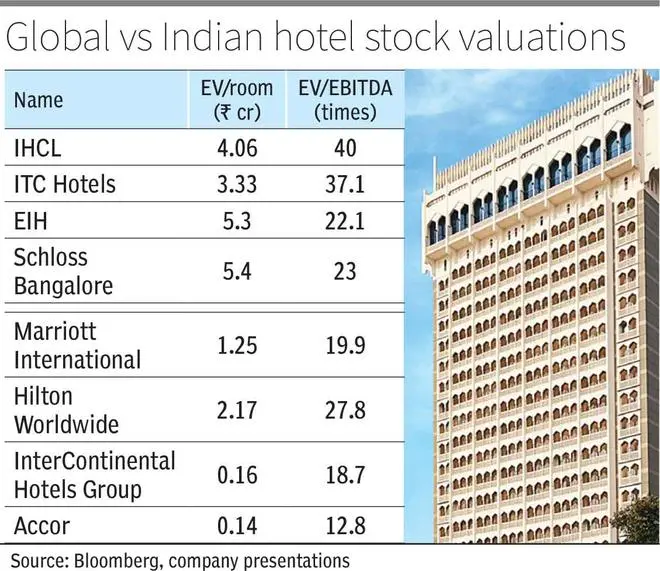Our Terms & Conditions | Our Privacy Policy
Why India’s hotels enjoy highest EV per room globally
India’s hotel sector is hogging the headlines with the country witnessing its largest-ever hospitality IPO. Brookfield-backed Schloss Bangalore, owner of The Leela hotels, recently mopped up ₹3,500 crore.
But there’s a bigger story brewing underneath: India’s top listed hotel companies now enjoy the highest enterprise value (EV) per room in the world. Take a closer look at the numbers.
Tata Group-owned The Indian Hotels Company (IHCL), the country’s largest listed hotel player, commands an EV/room of ₹4.06 crore. EIH, operator of the Oberoi chain, stands at ₹5.3 crore. Soon-to-be listed Schloss Bangalore, which operates at the very top-end of luxury hotels, has an EV/room of over ₹5 crore.
In contrast, global hospitality giants with far larger portfolios and stronger international brand equity trade at significantly lower EV/room figures. US-listed Marriott International, which manages over 5.8 lakh rooms globally, has an EV/room of ₹1.25 crore. Similarly, Hilton Worldwide stands at ₹2.17 crore. UK’s InterContinental Hotels Group has an EV/room of less than ₹20 lakh. France’s Accor is even lower at ₹14 lakh. China’s H World Group has an EV/room of less than ₹10 lakh.
On a high
So why are India’s hotel valuations per room so elevated?
First, Indian hotel companies continue to own a large portion of their inventory, unlike their global peers which primarily operate under asset-light franchise or management contracts. Owning land and buildings, especially in high-value city-centre locations, results in far higher capital intensity. This drives up the cost, even if the actual room count remains modest. For instance, IHCL has nearly 26,500 rooms, a fraction of what Marriott or Accor own or manage globally.
Two, optimistic growth expectations are already baked into these valuations. Investors are assigning a premium to Indian hotel stocks on the back of improving domestic tourism, higher room rates and occupancy and global travellers returning to India post-pandemic. With relatively younger hotel chains and room portfolios that are still expanding, Indian stocks are being priced for future potential.
Compare this with global peers where hotel majors like Marriott, Hilton, and Accor have shifted almost entirely to a franchise-plus-management model. This approach keeps debt and capital expenditure off their books, helping scale rapidly without bloating their balance-sheets. As a result, their enterprise value reflects fee-based income, not real-estate holdings, which naturally brings down EV/room metrics. But this doesn’t necessarily signal under-valuation, it reflects the difference in business models.
Asset-light models
Back in India, signs of a shift are visible. Firms like IHCL, EIH, and ITC Hotels are actively moving towards an asset-light strategy to drive future expansion. New projects are increasingly management or franchise-led. For instance, 15,900 of the new 19,500 IHCL rooms to be added will be under management contract. If this continues, India’s per-room valuation metrics may start converging with global benchmarks over time.
Interestingly, the strong valuations haven’t come on the back of heavy borrowing. Most of the top listed Indian hotel firms today have low debt on their books. Instead, enterprise value which is the sum of market capitalisation and the net debt on the balance- sheet has expanded largely due to rising market capitalisation in the post-Covid rally. Around 80 per cent of listed Indian hotels stocks have beaten Sensex’s 14 per cent three-year CAGR.
Over the last three years, top players have delivered handsome returns. EIH and IHCL stocks have grown at a CAGR of 42 and 51 per cent in last three years. In comparison, 3-year stock returns of global hotels like InterContinental (22.4 per cent CAGR), Hilton Worldwide (20.4 per cent CAGR), Marriott International (15.2 per cent CAGR) and Hyatt Hotels (14.3 per cent CAGR) reflect more modest gains.
Mid-tier hospitality stocks in Indian listed space have participated too. Chalet Hotels is up 46 per cent in three years. Lemon Tree Hotels has gained 33 per cent, while Royal Orchid has delivered 44 per cent.
A look at trailing EV/EBITDA further underlines India’s valuation premium. Indian Hotels trades at 40 times, Chalet at 30.4, and Lemon Tree at 24.1 and Schloss Bangalore at 23. In comparison, Marriott stands at 19.9 times, Accor at 12.8, and Las Vegas Sands at just 11. Hilton is the only outlier at 27.8 times. While the premium valuation is partly explained by more owned assets, for it to sustain the Indian hotel stocks will need to deliver without any glitches on the strong growth expectations as well.
Published on May 31, 2025
Images are for reference only.Images and contents gathered automatic from google or 3rd party sources.All rights on the images and contents are with their legal original owners.




Comments are closed.